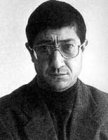

The "Dance of Men" is one of the major marks of punctuation in the narrative structure of this latest film by Yusup Razykov. Whether it is upon the birth of a child, a boy's beginning his journey into manhood, or a young man's entry into married life, the celebratory dance bursts forth with irrepressible energy. The dance neither tells a story of its own nor attempts to interpret the meaning of the event. The dance expresses the pure joy taken in the cyclic events of human social life. The dance cannot help to resolve the crises that threaten the course of this social life: such resolution is prerequisite to the commencement of the dance.
The resolution of such crises is the sphere of women, and this film thus turns out to be, much like Razykov's earlier films, much more about women than about men. It is the wisdom and the quiet intervention of the women of the community that insure the successful negotiation of the crises resulting from apparent conflicts between human nature and social requirements. The boy endures the pain of circumcision only when his future bride agrees to lie beside him in solidarity; only the women of the village confront the reality of pre-marital "visitations"; the women then see to the marriage of the unfortnate mother-to-be.
The film seems to consist of nothing more than an endless series of such crises that follow one upon another in an unstructured series with no clearly defined direction. Although it is clear that marriage is the desired end for the two protagonists, there is no "rising action" leading toward this climax and the film produces no suspense in the viewer. The impediments to the successful union of the bride and groom are real and serious: fear of pain, need to prove one's worth, loyalty to family and native community, demands of powerful outside forces, and societal responsibilities. Yet they are unconnected and form isolated, fragmentary conflicts with no overarching unity.
The unity is provided by the narrative itself, which is focussed through the consciousness of the bride's grandmother. The first scenes accompany the grandmother's "prophecy" of the marriage, told to the still young and quite ambivalent little girl. This prophecy soon metamorphizes into a self-sufficient narrative voice telling the entire story of the childhood, youth, courtship, and separation of the pair of lovers. This voice never quite becomes disembodied but can nonetheless no longer be located in space. It reenters the diagesis of the narrative only at the end, when the grandmother prophesies her own death, this time to the bridegroom, and exhorts him to go through with the marriage rather than let the death of an old woman become yet another obstacle to happiness. The story that seemed to be about impediments to love turns out to be about the triumph of love—that of the grandmother for those she is leaving behind.
Razykov's innovation lies not only in the construction of the narrative voice, but in the entire narrative structure of the film and in the philosophical dimension thus opened up. The first visual image of the child's waving hands reappears in the film's final sequence—they are the hands of a village girl attempting to wake the already deceased grandmother. The cycle of life is thus told by a voice that is itself cyclical—to ask whether the grandmother speaks from beyond the grave or whether she is reincarnated is to misunderstand the essence of human life in the Central Asian world depicted here by Razykov. The blind grandmother's "special gift" is a vision gained through true understanding that is not limited by a linear conception of life that would impose an oppressive structure upon the spontaneous "Dance of Men" in a way similar to the structure imposed by Soviet authority upon the life of Central Asian communities. This is certainly key to understanding the complex and polyvalent metaphor of the globe which seems to represent at varying instances the violence of state ideology, the harmony of balance, and the ties that bind generations despite the conflicts borne of both youth and stubborn old age.

Yusup Razykov was born in 1957 into a military family. He studied philology at Tashkent State University before beginning his training in the Department of Screenwriting at the State Institute of Filmmaking (VGIK) in Moscow. Films based on his scripts have been shot since 1983. The film Orator (1998) marked his directorial debut, followed in 2000 by Women's Paradise. His work as both screenwriter and film director, as well as his appointment as General Director of Uzbekfilm Studios, have surely been among the major factors contributing to the development of what has come to be called the New Uzbek Cinema.